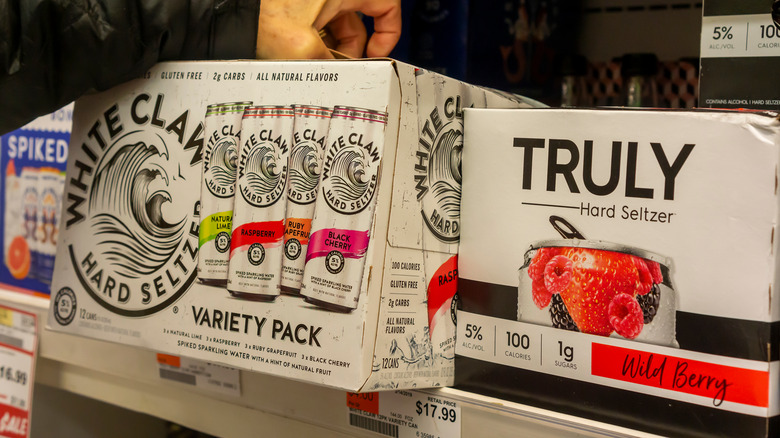Is The Hard Seltzer Trend Really Over?
Is the hard seltzer trend truly over? The novelty of the shiny cans and clear bubbly beverages does seem to have worn off, but those betting on the beverages to fade out altogether may be off the mark. Rising to fame for all the things these beverages are not — not full of carbs, not full of calories, and generally not full of artificial colors, these clear bubbly drinks will likely always hold an appeal for those taking note of the nutrition info (via Growler Mag). When it comes to how much appeal, however, for one hard seltzer giant, Boston Beer, who makes Truly, this appeal was strongly overestimated for the summer, according to Craft Brewing Business.
Dave Burwick, the Boston Beer's President and CEO, said Truly had a much less popular second quarter of 2021 than expected. He explained, "We increased our production of Truly to meet our summer peak and have had lower than anticipated demand for certain Truly brand styles which has resulted in higher than planned inventory levels at our breweries and increased supply chain costs and complexity." Now, to be clear, the brand still appears to be growing, but it no longer appears to be virally launching itself to success.
And this very well may signal the "writing on the wall" that the fad portion of hard seltzer sales is coming to a plateau.
Hard seltzer is no longer the "newest" thing
Sales figures would indicate that while hard seltzer remains a popular beverage, the growth of this product is definitely slowing. Data attributed to NielsenIQ shows sales of the beverage up by over 51% for the year ending July 10, 2021, yet the growth during these final 12 weeks was only 7.8%, as GroceryDive reports. Where brands were once racing to enter this adult beverage market, now there are signs of slowing, such as Molson discontinuing Coors Seltzer.
And while growth may be slowing, that does not in any way mean the market for hard seltzer is dying (via Vine Pair). Hard seltzer still accounted for 13% of all the retail dollars spent on alcohol during the holiday weekend of July 4th — that's no small amount. Where once manufacturers were racing to have a hard seltzer under every brand, perhaps now we'll see more specialization and niche markets instead.
We predict that hard seltzers will begin to plateau on mass sales, yet still find significant success in individual markets. They'll be known for key characteristics from affordability to artisan flavors. Until then, we'll be looking for the next great thing in bubbly beverages, and we'll be sure to share it with you too.

